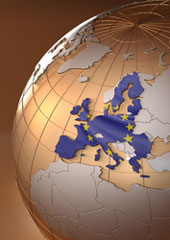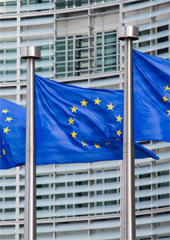The EU: Regulation King by Default
Is the United States’ anti-regulation stance undermining its global power position?
January 15, 2013

With one crucial exception, politicians all over the world recognize that economic integration in the age of globalization is a highly complex matter — and that it warrants smart regulation. That exception is the United States of America.
In that country, it is not just global regulation that is a highly contentious matter. Due to the ideological preferences of Republican lawmakers, any kind of regulation is highly suspect, including in its purely domestic form.
This leads to a particularly bizarre result — the de facto abdication of the United States from its previous longstanding role as the preeminent global rule setter. It is bizarre because the United States, and especially American conservatives, is not known to voluntarily give up U.S. power. If anything, both are too keen to maintain it.
And yet, the net effect of this ideologically motivated form of neo-isolationism is that the United States will have a lot less leverage on a host of pivotal global issues.
One could even argue that the United States has been focusing on the wrong battlefield over the recent decade. Global power in its modern 21st century form is no longer determined in ancient theaters like Iraq and Afghanistan.
Rather, it is shaped by whoever is the global standard setter for the things that really matter to human beings and modern existence — the products and services they use in their daily lives.
To understand how bizarre this abdication really is, imagine the U.S. military writing off a vital area of the world in its entirety. Sounds unlikely? Absolutely. The U.S. Congress, especially its Republican contingent, would never allow it. It usually can’t get enough of dallying around the globe, preferably militarily.
And yet, the very same people who are such extreme international activists on military matters are restraining U.S. international economic negotiators with strong shackles.
Ever since the days of the Reagan Administration, U.S. negotiators have had to contend with a U.S. Congress that is hostile to the idea of regulation — on issues ranging from consumer protection to climate change.
What these purists fail to understand is that, even in the self-imposed absence of a U.S. voice on the respective issue at hand, regulation will still occur at the global level.
Why? Because the rest of the world will insist on it. U.S. negotiators have essentially created a power vacuum — and the EU has moved to fill it.
The perplexing result is a global regulatory regime that, while not made in the USA, will have to be adopted in the United States anyway.
In some cases, the world needs more — and better — regulation. In other cases, lifting or loosening regulation can have a beneficial effect. This pragmatic approach used to be considered quintessentially American.
But the old equation has shifted considerably. Just when the United States turned ideological due to Congress’s predilections and became inflexible, the rest of the world began to adopt the classic American pragmatic approach.
In the U.S. political process, regulation is now basically considered a four-letter word. Even when there is a more open-minded executive branch, such as the Obama Administration, its freedom of maneuver is severely limited by business lobbyists and a highly ideological Republican membership in the U.S. Congress.
Both are determined to insist on as little government intervention as possible, in areas from antitrust to the environment and consumer affairs.
That may suit the political instincts of Republicans and U.S. business lobbies. But, increasingly, it no longer serves the power interests of the United States on a global basis.
As much as powerful U.S.-based corporations would love to deny it, they know that there is an ever-closer relationship between business, trade and regulation.
They realized that years ago, when the EU’s rejection of the GE-Honeywell merger in 2001 catapulted complex regulatory issues decided outside the United States onto the front pages of newspapers all around the United States.
Then, in 2006, the European Commission imposed fines on Microsoft for the company’s abuse of its near-monopoly position. Now, Google is in the headlines.
The search engine giant may have succeeded in defending itself before the Federal Trade Commission in the United States. But the writing is already on the wall.
As the other titans of U.S. business learned to their chagrin, the odds are that Google won’t be equally successful before European authorities. The EU is not as easily swayed by corporate influence as Washington is.
The United States has essentially adopted a rich spoiled child attitude. It tells the other kids playing in the sandbox that, if they don’t play exactly to its rules, it will pack up his toys and go home.
Improbable though it sounds, this is exactly what happens whenever the United States, due to its domestic incapacitation, does not actively engage in discussions, primarily with the EU, to shape the regime of global regulation.
In such a world, U.S. ideas will simply not be heard. And the Europeans may well make common cause with the Chinese who, like the Europeans, do not question the basic need for regulation and appreciate the clarifying effect this kind of standard-setting can have for long-term business planning and the creation of future product markets.
The world American conservatives end up with, ironically, is a self-fulfilling prophecy. Because they were not willing to play, the Europeans predominantly decide the global regulatory regime.
The simple fact is that the European market — with a 2011 GDP of $15.48 trillion, measured by purchasing power parity — is $400 billion larger than the U.S. economy, with a 2011 GDP of $15.08 trillion.
Multinationals will not, therefore, walk away from it because of costly regulations. Instead, they will adapt to those regulations. Consumers in the United States — and, in many cases, the companies themselves — will eventually demand that the U.S. adopt similar regulations.
U.S. consumers will demand it because they will be able to observe the benefits of which European consumers can avail themselves that are not available to them at home.
U.S. companies will demand it because the cost of operating in two different regulatory regimes is too high. Given the U.S. self-abdication, they are willing to accept as a de facto global regulatory standard whatever has been worked out within the European Commission’s regulatory framework.
Provided, of course, the Europeans can convince the third power, Asia. Fat chance for that to happen, U.S. strategists like to believe. Inebriated from years of convincing themselves that the United States really is a dynamic, Asian-style emerging market power and not some tired old-world entity, they do not see with clear eyes. Trouble is that Asia tends to side with Europeans.
That is the price to be paid by a nation, no matter how proud or powerful, whose politicians are ideologically determined to surrender the regulatory turf to others rather than to deal with regulation.
European policymakers, used to decades of U.S. domination in the regulatory area, cannot believe their luck. The United States has turned itself into a superpower that is full of purist intentions and engages itself only on what the rest of the world thinks are grave distractions and/or mere sideshows.
And the Chinese? They must be tickled to see the Americans prematurely abdicate their previous chokehold over the truest field of modern global power — regulatory standards.
Takeaways
Not the theaters of Afghanistan or Iraq, but the theater of global regulation is the location of future global power.
The United States has abdicated its previous longstanding role as the preeminent global rule setter.
Global power is shaped by whoever is the global standard setter for products and services that human beings use.
A global regulatory regime, while not made in the USA, will have to be adopted in the United States anyway.
Unlike Americans, the Chinese do not question the need for regulation and appreciate the effect it has on business planning.

